Papers by Prof. Dr. Salahaddin Khalilov
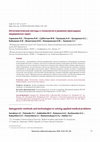
Bulletin of Siberian Medicine, 2020
Оптогенетика-инновационное и быстро развивающиеся научное направление, объединяющее достижения мо... more Оптогенетика-инновационное и быстро развивающиеся научное направление, объединяющее достижения молекулярной биологии и лазерных технологий для решения вопросов мониторинга различных биохимических процессов в клетке и контроля ее активности с помощью света. Данный обзор посвящен вопросам реализации и применения оптогенетического подхода для диагностики и лечения различных социально значимых заболеваний на молекулярно-генетическом уровне. Описаны различные способы доставки и встраивания генетических конструкций, кодирующих трансмембранные белки. Рассматриваются новые оптоволоконные технологии, используемые для исполнения имплантируемых устройств генерации и фиксирования сигналов в возбудимых тканях. Приводится анализ современных, наиболее используемых способов регистрации показателей эксперимента, указываются ключевые преимущества и недостатки различных методик. Ключевые слова: оптогенетика, опсины, ионные каналы, оптоволоконные системы, фотостимуляция, нейроинтерфейс, оптогенетическая терапия. Конфликт интересов. Авторы декларируют отсутствие явных и потенциальных конфликтов интересов, связанных с публикацией настоящей статьи.
Springer eBooks, 2009
This paper discusses some peculiarities - similarities and differences - of memory and remembranc... more This paper discusses some peculiarities - similarities and differences - of memory and remembrance (personal life memory). The mechanisms of storing knowledge and recollection have been analysed. It was shown that earlier used spirit-body or soul-body methods could not adequately explain the correlation between memory and remembrance. For consideration specific details of the correlation of memory and remembrance more realistic model of “spirit-soul-body” or “mind-soul-body” was developed
... In The passions of the soul in the metamorphosis of becoming, ed. Anna-Teresa Tymieniecka, XX... more ... In The passions of the soul in the metamorphosis of becoming, ed. Anna-Teresa Tymieniecka, XXI. ... In the context of a Heideggerian interpretation of Sophocles' Antigon, the situation of the human being as a desperado fighting with the overpowering might of the elements of ...
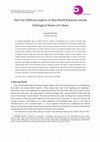
Philosophy study, May 28, 2016
In traditional philosophy, man is usually treated as a subject of knowledge, not as a subject of ... more In traditional philosophy, man is usually treated as a subject of knowledge, not as a subject of activity. This naturally led to an ignorance of his creative side and had its echoes in the models of the world put forward. Thus, when the world was mentioned the world meant was that perceived by man and the world man created or planned to create himself was given either a secondary treatment or else it was completely forgotten. But, as man is carrier of active spirit, the things he creates have their place in this world along those created by God. It is without doubt that things created by man are not produced against God's will. Still, human creativity is the corruption of the original creation, of the harmony of the world, of the book of nature. Man brings order, so to speak, to the world. He achieves this however at the cost of corrupting the Great Order within some narrow limits. Man himself is among the many highly interesting books written before and there exist as many variations of this book as there are human beings. What is the most difficult for man is though, to read his own book, to understand himself. In this article, the concept of the culture as a human creation is analyzed in the light of Man-World and Man-Nature-God relations. In this case, the author firstly explains the four different world models and then determines the boundaries of science and culture, as well as the individual and social strata of culture.
Springer eBooks, 2012
The architectonics of the human world is formed by means of reason. For this very reason, we like... more The architectonics of the human world is formed by means of reason. For this very reason, we liken reason to the framework and to a basis for a more resistant and rigid system. This system’s material, in fact, is knowledge, and its builder is reason. If reason had left this system, it would have collapsed. What leave the system and travel to other worlds and take trophy from them are the senses. However, the senses return and belong to man only then when they are under the control of reason and are linked to each other due to reason.

Every phenomenon is rich and meaningful against its background and environment. The lives of a hu... more Every phenomenon is rich and meaningful against its background and environment. The lives of a human being are not limited to their thoughts. The background, life situation, and ontopoiesis accompanying these thoughts are more important. Indeed, Husserl rightly tries to reduce our emotions and subjective features. However, there is hazy and vague content (substance) in the fine structure of a phenomenon. The goal is not to get rid of it but rather to illuminate it more and discover the background and substructure of this structure. In my opinion, it is possible to find a hologram of the noumena in the phenomenon. Our goal is to discover the method by which to find it. This event cannot be expressed fully by the term “intuition.” Intuition is the acceptance of the truth of “things-in-themselves” not from their manifestation or phenomenon, but from an unknown cosmic source. Actually, the illuminated front part of consciousness or a phenomenon should not be isolated from the context but, rather, should be taken in with its background and context. A pure consciousness or phenomenon isolated from the world and bordered on all sides cannot allow any precise thinking. Extreme precise extraction from conditions, mathematical or logical modeling of the world, the construction of the world from pure phenomena – all of these are idealization and, in fact, are a distortion of the reality. The mathematization of life is impossible. Life is unique and unrepeatable, having endless wealth. The desire to specify events on the level of mathematical figures is too idealistic. Hence, there is a need in phenomenology to go beyond formal and mathematical logic and to apply the idea of fuzzy logic.
Philosophy study, May 28, 2014

Springer eBooks, 2014
Aristotle brought Plato’s theory of ideas from the heavens to the earth. However, the human being... more Aristotle brought Plato’s theory of ideas from the heavens to the earth. However, the human being could at best see the form/copy and languished embodiment of the idea in the things. The thousands of years of scientific development was not enough for the human being, whose starting point was the sensory experience, to reach the ultimate truth. Though the discovery of the structure and form of things, and expressing them in mathematical patterns had demonstrated the great potential and possibility of logical thinking, it was impossible to prove that the reached conclusion was adequate to the truth. On the contrary, it became obvious that whenever a human stepped aside from logic, due to his/her inner illumination the truth was revealed more clearly. In this context, the term “Illumination (Ishraq)” as used in medieval Eastern philosophy, in particular in Ishragism Doctrine, expresses a shorter way that the cognition can lead to the truth. The ideas existing in things as a form/copy are thus discovered by a human being, as a living idea in his/her own “I” and hence, the truth is revealed within himself/herself. The living idea is not merely information, but also a source of excitement and life and in order to understand it, there is a need to refer to the concept of Ontopoiesis.
Springer eBooks, Dec 24, 2013
Phenomenology is traditionally thought to be a product of Western thought. However, Buddhism is a... more Phenomenology is traditionally thought to be a product of Western thought. However, Buddhism is also usually considered as one of the sources of Husserlian phenomenology. The close relationship of this teaching with Islamic philosophy, particularly with Ishraqism (Illuminationism) has been researched under the leadership of A.-T. Tymieniecka in the last decades. Although the existence of this relationship was first revealed by Henry Corbin, the wider analytic comparison of these two different philosophical research directions has been made in the works of A.-T. Tymieniecka.
The use of general descriptive names, registered names, trademarks, service marks, etc. in this p... more The use of general descriptive names, registered names, trademarks, service marks, etc. in this publication does not imply, even in the absence of a specific statement, that such names are exempt from the relevant protective laws and regulations and therefore free for general use. The publisher, the authors and the editors are safe to assume that the advice and information in this book are believed to be true and accurate at the date of publication. Neither the publisher nor the authors or the editors give a warranty, express or implied, with respect to the material contained herein or for any errors or omissions that may have been made. The publisher remains neutral with regard to jurisdictional claims in published maps and institutional affiliations.
Philosophy Study, 2014
The biggest insufficiency of the present mathematics is that it consists, in fact, of the eclecti... more The biggest insufficiency of the present mathematics is that it consists, in fact, of the eclectic mixture of two different models. In the first model, the world is taken as infinity and what is chosen as an element here is the unit. Everything is measured by the multiples of the unit. According to the second model, this world is in unity and its mathematical manifestation is the unit. The world is between zero and one. Everything here is measured by fraction. The simplified variants of the mathematical model of the world paves the way for the comparative analysis of its alternative philosophical interpretations.
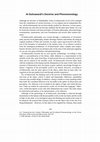
Islamic Philosophy and Occidental Phenomenology on the Perennial Issue of Microcosm and Macrocosm
Although the doctrine of Shihabaddin Yahya al-Suhrawardi (1154-1191) emerged from the combination... more Although the doctrine of Shihabaddin Yahya al-Suhrawardi (1154-1191) emerged from the combination of several doctrines, it is an original and an independent theory, which unfortunately has not been deeply studied yet. However, as time passes, this doctrine not only does not become outdated, but becomes more timely. In it can be found the elements and main principles of Kantian philosophy, phenomenology, existentialism, intuitionism, and even Freudianism and several other modern doctrines. Al-Suhrawardi's philosophy was created through a combination of Zoroastrianism, ancient Greek philosophy, Islamic theology ('kalam') and Sufism. By using an original synthesis of Plato and Aristotle, he made a great step forward in the direction of the formation of rationalism in the modern sense. If we abstract ourselves from the ontological problematic of al-Suhrawardi's rather complex and comprehensive doctrine and focus our attention only on the issue of the mind and cognition, we can see very great similarities with phenomenology. Al-Suhrawardi's doctrine has its own specific terminology. According to him, light is a personification of the divine, while darkness is a representation of the sensible world. But, apart from Plato, al-Suhrawardi does not confront the world of ideas and its relation to the sensible world. Al-Suhrawardi's doctrine rather deals with the irradiation of the human and the illumination of his inner world. Only at the moment of illumination does the human acquire authentic knowledge through revelation. Cognition of the perceptible world is not denied. However, according to al-Suhrawardi, only the outer aspects of the object, rather than its inner sides, are cognized on the perceptible level and through sensible experience. 1 For al-Suhrawardi, the thinking soul in the process of illumination acquires the real form of the object, which is whole and inseparable. Otherwise, separability concerns only sensible things. In addition, a thing is unable to create anything nobler than itself. He considered delusion to be inevitable in the sphere of observation and perception. Yet, delusion is not excluded in the sphere of logic and verbal description. Truth can neither be expressed by words, nor be fitted into language. 2 Otherwise, verbal description occurs only after illumination has ceased. The truth cannot be achieved by perception, or by representation, or by inference. Although in the gnoseology of al-Suhrawardi, knowledge is achieved through interrelation of the human with the perceptible world, on the one hand, and the world of light, on the other, in its ontological aspect the thinking soul stands at the center of his attention. He assumes that a human is able to see the object only in the case of its being illuminated. However, for the object to be cognized by a human, there needs 263
Phenomenology and the Human Positioning in the Cosmos, 2012
The architectonics of the human world is formed by means of reason. For this very reason, we like... more The architectonics of the human world is formed by means of reason. For this very reason, we liken reason to the framework and to a basis for a more resistant and rigid system. This system’s material, in fact, is knowledge, and its builder is reason. If reason had left this system, it would have collapsed. What leave the system and travel to other worlds and take trophy from them are the senses. However, the senses return and belong to man only then when they are under the control of reason and are linked to each other due to reason.
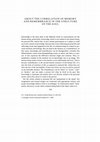
Memory in the Ontopoesis of Life, 2009
Knowledge is the most alien of the different forms of consciousness for the human being, particul... more Knowledge is the most alien of the different forms of consciousness for the human being, particularly, knowledge which is not related to the human being, his personal life, and his fate. In fact, human participation as a subject is ruled out in the content of knowledge. Because the events reflecting personal life and reflecting events that happened in the life of a human being are related to personal emotions and feelings, they are kept in the memory as a remembrance. In this sense, knowledge and remembrance can be distinguished. Certainly this differentiation comes from distinguishing events as native and alien to a person. It also expresses the difference between single and common. Thus, remembrance remains in the memory not as knowledge, but as an image. The human being retains events in his memory as he understands and lives. That is because remembrance is the second mental existence of the human life. It is also the form of existence of life, as opposed to material life, which does not obey the law of the inevitability of time and which can reoccur and be restored at any desirable moment. The remembrance can be "bitter" or "sweet," "pale" or "motley," and can make a person feel what he lived in his past. But knowledge is inanimate and neutral and is not directly related to the personal senses, and in this sense it is alien to the person. Are the events related to personal life not summarized in the mind? Are imagination and sensual images not connected with appropriate notions, and proper knowledge deduces from it accordingly? As Suhrawardi stated: "luminosity, discovery, occurs when a human being finds in the object what is in 243

Every phenomenon is rich and meaningful against its background and environment. The lives of a hu... more Every phenomenon is rich and meaningful against its background and environment. The lives of a human being are not limited to their thoughts. The background, life situation, and ontopoiesis accompanying these thoughts are more important. Indeed, Husserl rightly tries to reduce our emotions and subjective features. However, there is hazy and vague content (substance) in the fine structure of a phenomenon. The goal is not to get rid of it but rather to illuminate it more and discover the background and substructure of this structure. In my opinion, it is possible to find a hologram of the noumena in the phenomenon. Our goal is to discover the method by which to find it. This event cannot be expressed fully by the term “intuition.” Intuition is the acceptance of the truth of “things-in-themselves” not from their manifestation or phenomenon, but from an unknown cosmic source. Actually, the illuminated front part of consciousness or a phenomenon should not be isolated from the context bu...
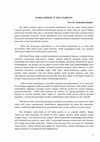
Her halkın tarihinde güncel sosyo-politik problemlerin yanı sıra onun strateji gelişim çizgisini ... more Her halkın tarihinde güncel sosyo-politik problemlerin yanı sıra onun strateji gelişim çizgisini belirleyen, millî özbilinçten kaynaklanan görevler de vardır. Fakat ne yazık ki, halkın millî-siyasal benliğini ifade eden ve devletçilik bilincinin tezahürü olan hayati meseleler bazen güncel problemler içerisinde, siyasal çekişmelerin, yerel sosyo-politik çıkarların, yine maddi ihtiyaçların karşılanmasından doğan bireysel ve toplumsal çabaların mücadelesi sahnesinde geri plana itilir ve bazen de büsbütün unutulur.
Millî ruhu korumanın, geliştirmenin ve yeni nesillere ulaştırmanın en iyi şekli millî devletçiliktir. Millî devlet ancak coğrafi bölgenin, maddi zenginliklerin değil, aynı zamanda millî-manevi değerlerin korunmasına da hizmet eder.
Millî felsefi fikrin, ahlakın, gelenek-göreneklerin yeni kuşaklara iletilmesi, varlığının devam ettirilmesi bakımından millî-manevi yapıtlar, sanatsal edebiyat gerçekten büyük önem taşımaktadır.


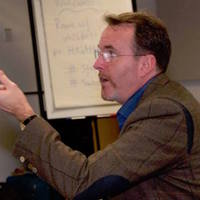






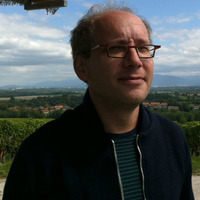

Uploads
Papers by Prof. Dr. Salahaddin Khalilov
Millî ruhu korumanın, geliştirmenin ve yeni nesillere ulaştırmanın en iyi şekli millî devletçiliktir. Millî devlet ancak coğrafi bölgenin, maddi zenginliklerin değil, aynı zamanda millî-manevi değerlerin korunmasına da hizmet eder.
Millî felsefi fikrin, ahlakın, gelenek-göreneklerin yeni kuşaklara iletilmesi, varlığının devam ettirilmesi bakımından millî-manevi yapıtlar, sanatsal edebiyat gerçekten büyük önem taşımaktadır.
Millî ruhu korumanın, geliştirmenin ve yeni nesillere ulaştırmanın en iyi şekli millî devletçiliktir. Millî devlet ancak coğrafi bölgenin, maddi zenginliklerin değil, aynı zamanda millî-manevi değerlerin korunmasına da hizmet eder.
Millî felsefi fikrin, ahlakın, gelenek-göreneklerin yeni kuşaklara iletilmesi, varlığının devam ettirilmesi bakımından millî-manevi yapıtlar, sanatsal edebiyat gerçekten büyük önem taşımaktadır.
olunur; müxtəlif dövrlərdə və müxtəlif coğrafi məkanlarda yaranmış
fəlsəfi təlimlərdə eyniyyət və fərq məqamları üzə çıxarılır.
Məqsəd filosofların həyatı, yaradıcılığı və təlimləri haqqında
məlum bilikləri oxuсulara çatdırmaq olmadığından, əsər dərslik,
dərs vəsaiti və ya ensiklopedik bir topludan daha çox, dünya fəlsəfi
fikrinin ayrı-ayrı məqamlarının müəllif mövqeyindən şərhidir.
Fəlsəfə ilə peşəkar səviyyədə maraqlananlar üçün nəzərdə tutulmuşdur.
Elm adamları üçün nəzərdə tutulmuşdur.
Для широкого круга читателей.